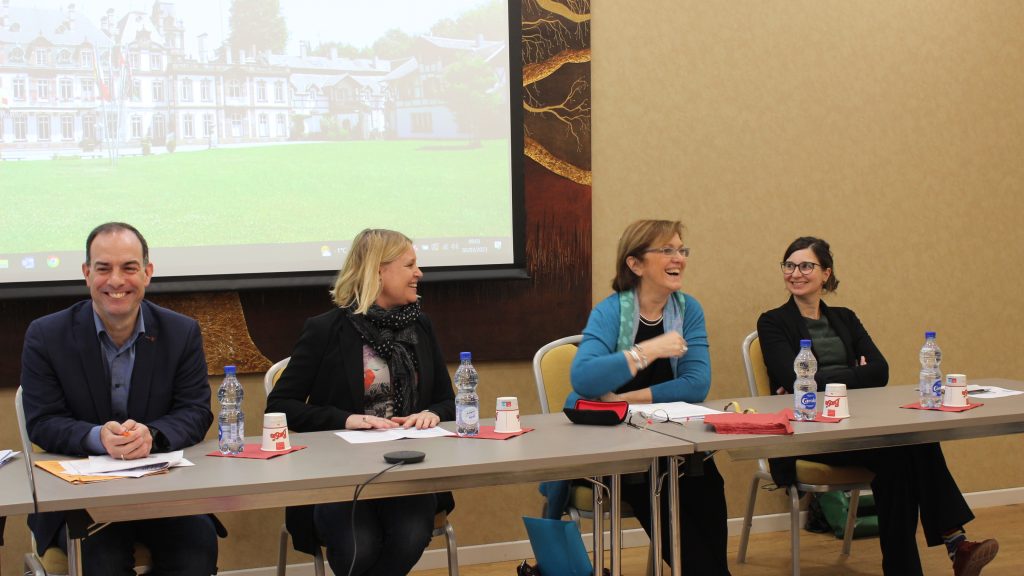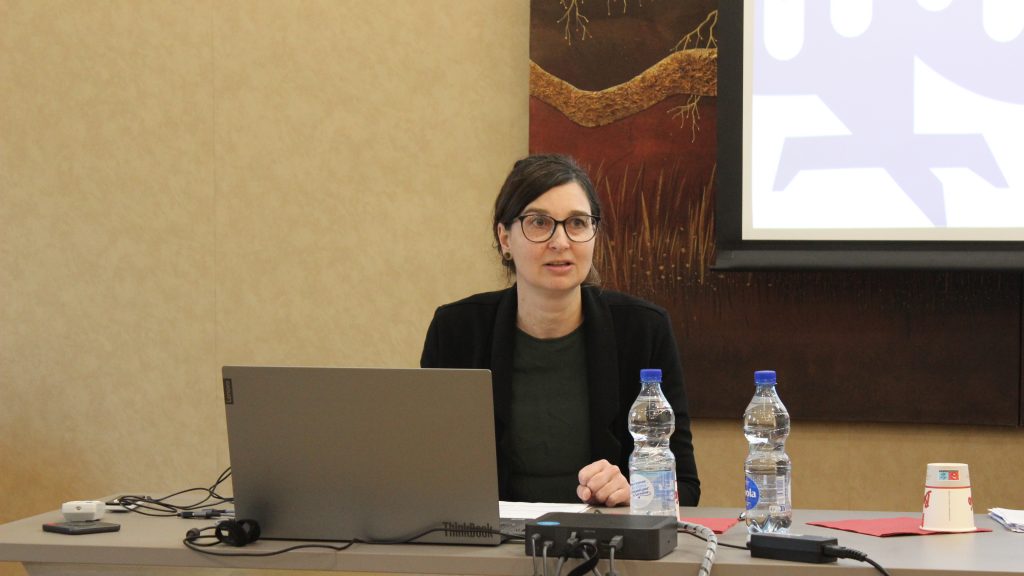This seminar examines the narrative of a decentralised Europe by examining effects of the Covid-19 crisis on cross border cooperation. The emphasis is on the questioning of integrated cross-border spaces and the multi-level management of the territorial borders by the process of (re)bordering. By the confrontation of presentations by students and communications by researchers and actors, a critical look will be taken at the consequences of the crisis on social and territorial cohesion at the frontiers of the EU. The seminar also examines the possible solutions for innovative mechanisms of border management in cross-border territories as proposed by the treaty of Aix-la-Chapelle. This task corresponds to the event E1.3.
Cet article est également disponible dans la langue de Charles de Gaulle ici !

The second day, the castle-talks started at 8h30 with a warm welcoming speech by the squire of the Château de Pourtalès, Harald Leibrecht. He recalled what the CEPA foundation was, which is the partner organizer for the event. It is thanks to this foundation that foreign students follow a training on European studies at the château de Pourtalès, and that they presented some of their works in the disputatio during the day. Birte Wassenberg and Frédérique Berrod took over the floor after Harald Leibrecht, reminding that the castle-talks were organized as part of the Jean Monnet activities at Sciences Po Strasbourg, as to say the franco-german center of excellence (together with the Hochschule Kehl), and the chairs in History of European integration and EU law. The second day of the castle-talks is specifically dedicated to the activities of the chair of History of European integration on the european narratives on borders in History, especially since, as Birte Wassenberg stated, borders in Europe are more and more associated with the idea of “fortress Europe,” and less and less with openness and a “Europe without borders.”
Round-table: “Europe without borders” (9h-10h30)
This is why the Chair organized a round-table on “Europe without borders”, gathering researchers from across western Europe. The session was chaired by Birte Wassenberg because Anne Thévenet from the Euroinstitut of Kehl, had a last-minute impediment. Invited researchers were Valeria Fargion (from the University of Florence), Michael Frey (from the Hochschule Kehl) and Daniela Braun (from the Universität des Saarlandes). “Europe without borders” made Birte Wassenberg orient the seminar toward a more general stance than only considering the covid-19 crisis. She delegated the intervention on that particular subject to her 4th year students at Sciences Po Strasbourg for this task. Rather than that, the conference given by researchers was about their own works and based on their domain of expertise. Valeria Fargion therefore presented the situation of Euroscepticism and its impacts on the change of narrative from “Europe without borders” to a “fortress Europe”; Michael Frey developed in what ways the treaty of Aix-la-Chapelle (and the recent treaty of Quirinal and Barcelona) discusses cross-border cooperation; and Daniela Braun presented a study (currently work in progress) on the impact of Euroscepticism across EU member states’ borders, and the way their argumentation affects debates over the EU as a polity but also the policies conducted at the EU level. After the round-table, students from the CEPA and Hochschule Kehl presented some of their works in groups to the researchers of the roundtable, for feedback and a session of questions on the theme of the presentation.

Valeria Fargion: Borders and populism
Valeria Fargion, from the University of Florence, recalled the main phases of the construction of borders of Europe. It happened first along state building (from the time of the Westphalian Treaties), second with the welfare state (with the differences in policies, as for instance social security, education, etc.). With World War 2 and the Treaty of Rome, History came “against 300 years of History” and development of national identities. However, in the 1970s, the economic development slowed down, allowing for protests of the losers of the post-war acceleration of globalization to rise. Contestants of this lowering of the borders are identified as persons who are suffering from economic choices, as for the lack of common fiscal policy across the European states subject to integration. Populist movements are the reaction to economic and cultural concerns and anxieties, and are turned against migrants, considered as scapegoats just like the perceived corrupted elites. Populists, who accessed to power like in Sweden, Italy, Greece, or who have solid grounds like in France, ask for more physical barriers such as walls. In other terms, with populists, “The Berlin Wall was a symbol of oppression; it is now a symbol of protection.” When questioned about the similarities between right and left populisms, Valeria Fargion emphasized that left-wing populist formations prefer targeting international firms rather than corrupted elites.

Michael Frey: Legal perspective
Michael Frey, from the Hochschule Kehl, insisted that borders bear different natures depending through which lenses we see them. Indeed, a border can be a connective of a barrier, and can be geographical, political, economic, but also cultural, linguistic, etc. Law is however one of the more important aspects of today’s borders, even though borders are no longer visible from a legal point of view in the European Union and in the Schengen area, borders are also separating these integrated spaces to the rest of the world. Borders can also be closed among countries of this integrated area, as shown during the Covid crisis. There are provisions in bilateral treaties that allows for an overcoming of legal borders. This is for instance the case for article 13(2) of the Aachen treaty (France and Germany), but also in article 10(2) in the Treaty of Quirinal (France-Italy) and article 30(5) of the Treaty of Barcelona (France and Spain). There are therefore legal tools for the disappearance of borders within the EU, but no political will to do so.

Daniela Braun: Euroscepticism across borders
Daniela Braun, from the Universität des Saarlandes, presented a non-yet written paper on increase of Euroscepticism (together with Giuseppe Carteny from the Universität des Saarlandes and Ann-Kathrin Reinl from the Universiteit van Gent). The paper focuses on the calls for more national sovereignty becoming louder since the 1980s in Europe. The paper first focuses on the way Eurosceptic parties shape party competition in the EU. In order to assess this question, the researchers analysed the different references in political manifestos from 2009, 2014 and 2019. It appears that Eurosceptic parties talk more about the polity “European Union” than about the policies themselves, even though there has been a turn since 2019 since which policies are more and more discussed. This allows for the assumption that Eurosceptic parties shape not only party competition on the policy, but also on particular EU policies. The second research question then focuses on the way Eurosceptic parties influence the way citizens support and recognise the political legitimacy of the EU. The overall findings are that Eurosceptic parties focus on both EU polity and policy issues, and that the electoral success of Eurosceptic parties affect EU support, which means that Eurosceptic parties seem to shape party competition over European issues and have an impact on EU legitimacy (without correlation however). The expectations are then that citizen’s support for the EU decreases if mainstream parties do not respond to the Eurosceptic critique (and therefore fail to provide appropriate policy responses to the critique).




